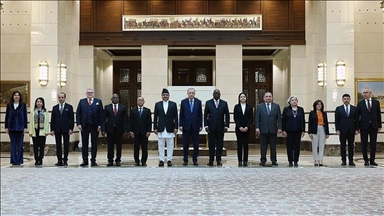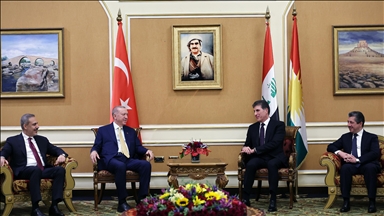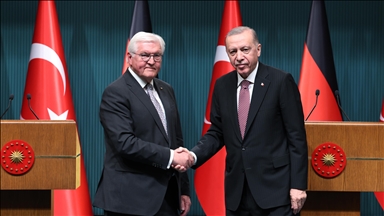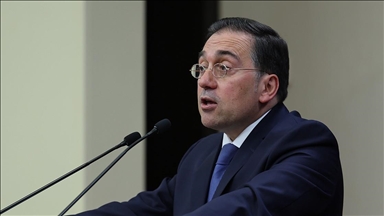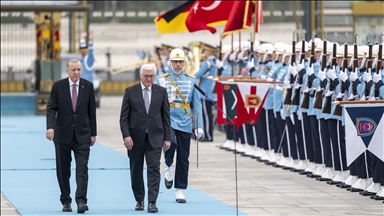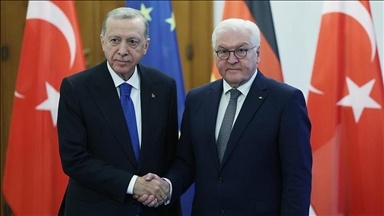OPINION - Can Turkiye-UAE's rapprochement heal regional divisions?
A closer relationship between Ankara and Abu Dhabi benefits not just the two nations, but the entire MENA region as well
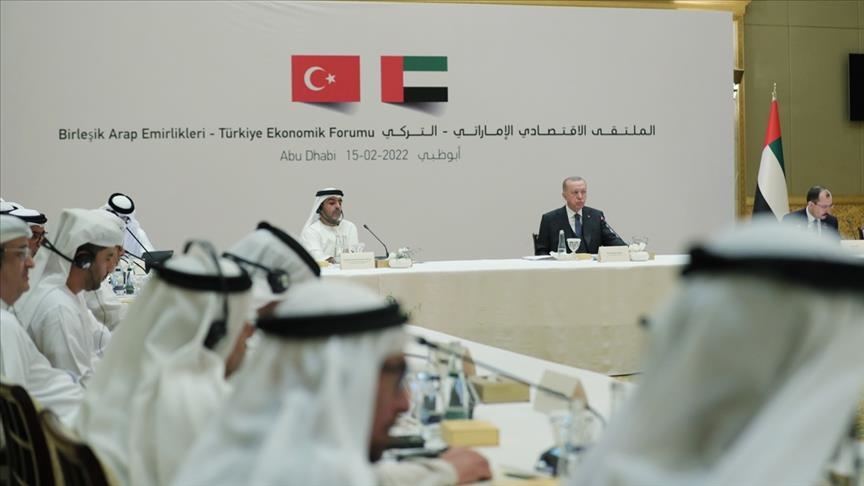
*The author is a researcher and journalist focusing on conflict and geopolitics in the Middle East and North Africa, primarily related to the Gulf region.
ISTANBUL
Turkish President Recep Tayyip Erdogan's two-day visit to Abu Dhabi on February 13 marked another substantial turning point in previously sour relations between Turkiye and the United Arab Emirates (UAE), as both countries seek to end a feud that has for long defined the geopolitical arena of the Middle East and North Africa.
Positive agenda on the table
The Burj Khalifa tower in Dubai lit up with the Turkish flag and bore the Turkish words “Hos Geldiniz” (welcome), indicating the UAE’s wishes to promote a positive image of Turkiye to its residents amid the two countries’ flourishing relations.
"During this visit, we aim to develop the momentum we have captured with the United Arab Emirates and to take the necessary steps for ties to go back to the level they deserve," Erdogan told reporters at Istanbul's Ataturk Airport before he departed on his first visit to Abu Dhabi in nine years.
Meanwhile, Anwar Gargash, diplomatic advisor to the UAE President, captured the sentiment between Ankara and Abu Dhabi, writing in a Twitter post that “The UAE sees economic and developmental cooperation … as a key tool in wisely managing various issues to rid our region of continuous escalation.”
During the meeting, 13 agreements were signed, including ones on commerce, industry, health and medical sciences, land and sea transportation, and climate change.
Economic cooperation
Increasing already flourishing economic cooperation was indeed largely on the agenda. In the first half of 2021, trade between Turkiye and the UAE reached $7.2 billion, and Abu Dhabi now hopes to double or triple trade volume with Ankara. The UAE also added Turkiye to its travel Green List of countries, following an easing of travel restrictions-indicating that Gulf tourism to Turkiye is set to increase.
Both parties signed a joint statement on starting negotiations for a bilateral trade and investment deal, known as a Comprehensive Economic Partnership Agreement (CEPA).
Previous disagreements
Divisions between the two countries brewed after the Arab Spring uprisings, with Turkiye backing opposition groups across the region including Islamic factions that won elections in Egypt and Tunisia. Abu Dhabi perceived the upsurge of democratic and Islamic movements as a threat to its designs for the region and feared they could spark calls for change within the dynastic Emirati government.
Following these ideological differences, relations between the two countries substantially deteriorated after the failed coup attempt in Turkiye in 2016, which Ankara accused Abu Dhabi of supporting. While this was deemed as a national security threat within Turkiye, Ankara’s alliance with Qatar during the 2017 Gulf crisis was seen as intolerable by the UAE and the other counties which blockaded Doha, namely Saudi Arabia, Egypt and Bahrain.
Both Ankara and Abu Dhabi are also feeling increasing battle-weariness over different regional contexts, such as Libya, where Turkiye backed the then-internationally recognized Government of National Accord (GNA) in Tripoli to repel the offensive of Khalifa Haftar’s Libyan National Army (LNA) in 2020.
Libya was indeed a central part of the rivalry. Ankara sought to protect its maritime agreement with the then Tripoli-based government, while Abu Dhabi wanted to stem the country’s democratic hopes and instead secure a form of “authoritarian stability.” Yet Ankara’s intervention had forced the UAE to backtrack on its support for Haftar, while Abu Dhabi also faced growing scrutiny for its overt support for the now defeated warlord.
Changes in the international arena
One of the reasons driving Turkiye and the UAE closer was the lack of the US’ leadership in regional affairs. A previous rapprochement came after Washington’s botched withdrawal from Afghanistan in August, which prompted its allies to drift towards each other -seemingly to take solving regional affairs into their own hands. After all, Ankara has also tried to bridge the gap with Egypt and Saudi Arabia, after both of whom were aligned with the UAE against blockading Qatar and opposing Turkiye.
Of course, the Donald Trump era gave rise to more confrontations, as the former US President bolstered Washington’s partners in Riyadh and Abu Dhabi, such as his words in support of the blockade on Qatar. Yet not only has Trump’s era ended and given rise to more Biden-inspired pragmatism, but the current US administration of Joe Biden has also failed to employ leadership in the Middle East and beyond, such as through his indecisiveness towards Libya and not to mention Afghanistan.
As a result, we could expect to see further rapprochement across the region. It has the potential to stimulate peacebuilding in Libya, which has faced fractures within its current path towards elections despite the conflict ending there. It could spur on talks between other countries that have had previous tensions, such as Iran and Saudi Arabia, which have both expressed an interest in engaging with one another.
So far, Libya and Syria could be countries to benefit, as well as in the Horn of Africa. After all, the region has long been torn apart between diverging geopolitical ties and militarization. Thus, while there would be more economic benefits for both Ankara and Abu Dhabi, wider benefits could be felt across the region.
**Opinions expressed in this article are the author’s own and do not necessarily reflect the editorial policy of Anadolu Agency.
Anadolu Agency website contains only a portion of the news stories offered to subscribers in the AA News Broadcasting System (HAS), and in summarized form. Please contact us for subscription options.


